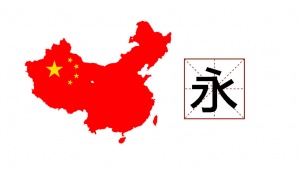Difference between revisions of "Language/Mandarin-chinese/Vocabulary/永-yǒng"
m (Quick edit) |
|||
| (5 intermediate revisions by 2 users not shown) | |||
| Line 1: | Line 1: | ||
[[File:永-yǒng-character.jpg|thumb| | [[File:永-yǒng-character.jpg|thumb]] | ||
Welcome to our Mandarin Chinese vocabulary lesson focusing on the character "永 yǒng". As a seasoned Mandarin Chinese language teacher with 20 years of experience, I am excited to guide you through this lesson. After mastering the character 永 yǒng, you may also want to explore other related vocabulary lessons, such as [[Language/Mandarin-chinese/Vocabulary/检(檢)-jiăn-examine|检(檢) jiăn examine]], [[Language/Mandarin-chinese/Vocabulary/把-bă-take,-hold|把 bă take, hold]], and [[Language/Mandarin-chinese/Vocabulary/深-shēn-deep|深 shēn deep]]. These lessons will further enhance your understanding and usage of Mandarin Chinese vocabulary. Let's dive in and start learning! 😊📚 | |||
==永 (yǒng)== | ==永 (yǒng)== | ||
Today, we will learn the Chinese character 永 (yǒng) which means "forever" or "eternity" and is pronounced "yǒng". | Today, we will learn the Chinese character 永 (yǒng) which means "forever" or "eternity" and is pronounced "yǒng". | ||
This character balanced and perfect structure onsists of 8 strokes which are the basic strokes of "Regular script", which is the newest of the Chinese script styles, hence most common in modern writings and publications. | This character balanced and perfect structure onsists of 8 strokes which are the basic strokes of "Regular script", which is the newest of the Chinese script styles, hence most common in modern writings and publications. | ||
It is said the Calligrapher-Sage, Wang Xizhi, spent many years practicing this character (among others). | It is said the Calligrapher-Sage, Wang Xizhi, spent many years practicing this character (among others). | ||
| Line 25: | Line 25: | ||
==Writing== | ==Writing== | ||
<youtube>SM2fokUZpCM</youtube> | <youtube>SM2fokUZpCM</youtube> | ||
<youtube>tpiCdVdco80</youtube> | <youtube>tpiCdVdco80</youtube> | ||
[[Category: Chinese-character]] | [[Category: Chinese-character]] | ||
==Other Lessons== | |||
* [[Language/Mandarin-chinese/Vocabulary/险(險)-xiăn-danger|险(險) xiăn danger]] | |||
* [[Language/Mandarin-chinese/Vocabulary/教-jiào-teach;-teaching;-religion-jiāo-teach|教 jiào teach; teaching; religion jiāo teach]] | |||
* [[Language/Mandarin-chinese/Vocabulary/主-zhŭ-master,-host,-lord;-main|主 zhŭ master, host, lord; main]] | |||
* [[Language/Mandarin-chinese/Vocabulary/究-jiū-study|究 jiū study]] | |||
* [[Language/Mandarin-chinese/Vocabulary/tā-it|tā it]] | |||
* [[Language/Mandarin-chinese/Vocabulary/Colors|Colors]] | |||
* [[Language/Mandarin-chinese/Vocabulary/愿(願)-yuàn-wish,-want|愿(願) yuàn wish, want]] | |||
* [[Language/Mandarin-chinese/Vocabulary/音-yīn-sound|音 yīn sound]] | |||
* [[Language/Mandarin-chinese/Vocabulary/假-jià-vacation,-leave-jiă-false;-if|假 jià vacation, leave jiă false; if]] | |||
* [[Language/Mandarin-chinese/Vocabulary/Describe-arrangement-of-things-in-Chinese|Describe arrangement of things in Chinese]] | |||
<span links></span> | |||
Latest revision as of 12:42, 25 March 2023
Welcome to our Mandarin Chinese vocabulary lesson focusing on the character "永 yǒng". As a seasoned Mandarin Chinese language teacher with 20 years of experience, I am excited to guide you through this lesson. After mastering the character 永 yǒng, you may also want to explore other related vocabulary lessons, such as 检(檢) jiăn examine, 把 bă take, hold, and 深 shēn deep. These lessons will further enhance your understanding and usage of Mandarin Chinese vocabulary. Let's dive in and start learning! 😊📚
永 (yǒng)[edit | edit source]
Today, we will learn the Chinese character 永 (yǒng) which means "forever" or "eternity" and is pronounced "yǒng".
This character balanced and perfect structure onsists of 8 strokes which are the basic strokes of "Regular script", which is the newest of the Chinese script styles, hence most common in modern writings and publications.
It is said the Calligrapher-Sage, Wang Xizhi, spent many years practicing this character (among others).
As a radical[edit | edit source]
It's a radical in other characters like in:
- 脉 (mài): arteries and veins
- 咏 (yǒng): to sing
- 泳 (yǒng): to swim
In words[edit | edit source]
The characters appears in words like:
- 永不 (yǒng bù): never
- 永世 (yǒng shì): forever
- 永恒/永恆 (yǒng héng): eternal, everlasting
- 永生 (yǒng shēng): to live forever
Writing[edit | edit source]
Other Lessons[edit | edit source]
- 险(險) xiăn danger
- 教 jiào teach; teaching; religion jiāo teach
- 主 zhŭ master, host, lord; main
- 究 jiū study
- tā it
- Colors
- 愿(願) yuàn wish, want
- 音 yīn sound
- 假 jià vacation, leave jiă false; if
- Describe arrangement of things in Chinese
